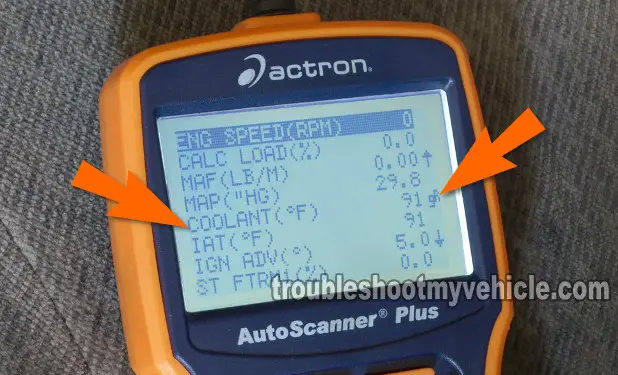START HERE: Troubleshooting DTC P0118
What's gonna' help us diagnose and repair the P0118 ECT Sensor Circuit High Voltage OBD II diagnostic trouble code (DTC), that's lighting up your check engine light, is remembering/knowing that the PCM thinks the engine coolant temperature is around -4°F (20°C) or colder.
By connecting a scan tool with Live Data capability, you and I can see the engine coolant temperature the PCM is seeing and thus confirm that the problem is either present or not present.
Now, if you don't have a scan tool with Live Data capability and need to buy one, check out my recommendation here: Actron CP9580 Scan Tool Review.
Here's a brief description of the tests you'll be doing with the help of this tutorial:
- Check the engine coolant's temperature.
- This is where your scan tool (with Live Data capability) will come in handy.
- What we're looking for is to see if the ECT sensor is reporting a temp that's -4°F (20°C) or colder.
- TEST 1: Checking The Engine Coolant Temperature Value.
- Check the condition of the IAT sensor's wires and connector for an open-circuit problem.
- This involves removing the hard plastic protector that's over the wires and inspecting the condition of the two ECT sensor wires.
- We'll also do a wiggle test of the ECT sensor's 2 wires.
- TEST 2: Checking The Condition Of The ECT Sensor's 2 Wires.
- Jumper the ECT sensor's circuits and see if the PCM reacts by seeing a coolant temp of 300°F(150°C).
- We'll use a jumper wire to jumper the sensor's circuits.
- This test will help you to eliminate a bad PCM and/or a hidden electrical short somewhere in the wiring between the PCM and ECT sensor.
- TEST 3: Jumpering Together The ECT Sensor Circuits.
TEST 1: Checking The Engine Coolant Temperature Value

A P0118 ECT Sensor Circuit High Voltage tells us that your Honda's PCM is seeing an engine coolant temperature of -4°F (20°C) or colder.
So the first thing we'll do is connect a scan tool and verify it via its Live Data mode.
Your scan tool displays the temperature of the ECT sensor via the PID (Parameter Identification) labeled: COOLANT. The temperature displayed on your scan tool is also the engine coolant temp that your Honda's PCM is seeing (see the image above).
If you don't have a scan tool and you need to buy one, check out my Actron CP9580 Scan Tool Review.
OK, this is what you need to do:
- 1
Connect your scan tool to your Honda (or Acura) car or mini-van and turn the key to the on position.
NOTE: This test is done with the Key On Engine OFF (KOEO). - 2
Go to its Live Data mode once the scan tool has powered up.
Scroll down to the PID labeled COOLANT (°F) - 3
The COOLANT PID should register a temperature that's ±10 °F of ambient temperature (if all is normal)
- So let's say that it's 50 °F outside, then the ECT sensor PID should register something between 40 to 60 °F.
- 4
You'll see one of three possible temperature results:
- -4°F (-20°C).
- OR
- 300°F (-150°C).
- OR
- The current outside coolant temperature.
Let's interpret your test results:
CASE 1: Your scan tool shows a -4 °F (-20°C) reading. This confirms trouble code P0118 ECT Sensor Circuit High Voltage Input and that there's problem with the ECT sensor or its circuits.
Seeing an extreme cold temperature of -4°F (-20°C) indicates one of two things, either that the ECT sensor is bad or the ECT sensor connector's wires have an ‘open’ (think unplugged sensor).
The next step is to physically check the condition of the wires and do a simple wiggle test. Go to: TEST 2: Checking The Condition Of The ECT Sensor's 2 Wires.
CASE 2: Your scan tool shows a 300°F (150°C) reading. This confirms that there is a problem with the engine coolant temperature (ECT) sensor.
You'll also see a diagnostic trouble code P0117 (ECT Sensor Circuit Low Voltage) stored in the PCM's memory.
The most likely cause will be that the ECT sensor circuits (wires) are shorted together. This usually happens in the section of the 2 wires nearest to the ECT sensor's connector.
For more specific P0117 trouble code info, go to: How To Test: P0117 OBD II Trouble Code (Honda 2.2L, 2.3L).
CASE 3: Your scan tool shows a temperature reading that's ±10 °F of ambient temperature. This tells you that at the moment the ECT sensor and its circuits are OK and more importantly, that the problem is intermittent.
But, since your scan tool retrieved a DTC P0118 the problem may just be hiding at the moment, I recommend clearing the diagnostic trouble code (DTC) and road testing your vehicle to see if the code comes back.
If the P0118 DTC does come back, repeat this test once more.
